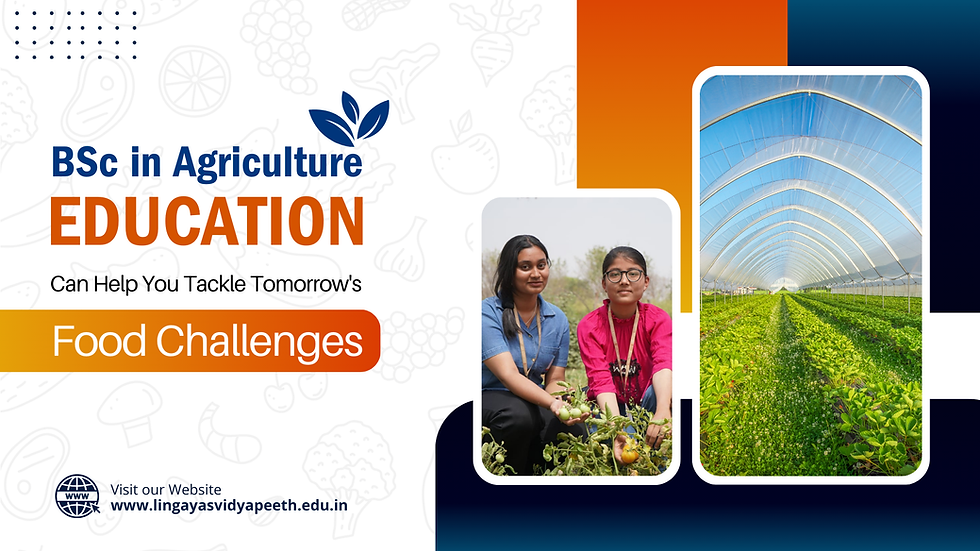Top 10 Latest Techniques Shaping the Future of Agriculture
- lingayasvidyapeeth60
- Dec 31, 2024
- 2 min read

The agricultural sector has undergone a remarkable transformation in recent years, fueled by advancements in technology. These innovations are not only increasing productivity but also addressing challenges like climate change, resource scarcity, and sustainability.
Here are some of the latest techniques shaping the future of agriculture:
1. Precision Agriculture
Precision agriculture leverages GPS technology, IoT devices, and data analytics to optimize farming practices. Farmers can monitor soil health, crop growth, and weather conditions in real time, enabling them to make data-driven decisions and reduce waste.
2. Vertical Farming
Vertical farming is revolutionizing urban agriculture by growing crops in vertically stacked layers. Using hydroponics or aeroponics, this technique maximizes space, conserves water, and eliminates the need for harmful pesticides.
3. Drones in Agriculture
Drones are becoming indispensable for tasks like crop monitoring, irrigation management, and pest control. Equipped with advanced imaging technology, drones provide detailed aerial views, helping farmers detect issues early and act promptly.
4. Robotics and Automation
From autonomous tractors to robotic harvesters, automation is streamlining labor-intensive tasks. These machines are not only efficient but also reduce the reliance on manual labor, addressing workforce shortages.
5. Artificial Intelligence (AI) and Machine Learning
AI-powered tools are analyzing vast datasets to predict crop yields, optimize planting schedules, and detect diseases. Machine learning algorithms are also helping farmers adapt to changing climatic conditions by offering tailored solutions.
6. Biotechnology and Genomics
Advances in biotechnology are enabling the development of genetically modified crops that are resistant to pests, diseases, and extreme weather conditions. Genomic editing tools like CRISPR are paving the way for more resilient and nutritious crops.
7. Smart Irrigation Systems
Smart irrigation systems use sensors to measure soil moisture and deliver water only when necessary. This not only conserves water but also ensures crops receive optimal hydration.
8. Blockchain in Supply Chain Management
Blockchain technology is enhancing transparency and traceability in the agricultural supply chain. It allows consumers to verify the origin of their food, ensuring ethical and sustainable practices.
9. Climate-Resilient Farming Practices
Techniques like agroforestry, no-till farming, and integrated pest management are helping farmers adapt to climate change while maintaining soil health and biodiversity.
10. Renewable Energy Integration
The use of solar panels and wind turbines in agriculture is reducing dependence on fossil fuels. These renewable energy sources are powering irrigation systems, greenhouses, and storage facilities.
Conclusion
The future of agriculture is being shaped by innovative techniques that prioritize efficiency, sustainability, and resilience. By choosing to pursue B.Sc and M.Sc Agriculture, students can play a pivotal role in this transformation. Lingaya’s Vidyapeeth, recognized as the best agriculture college in Delhi NCR, focuses on modern agricultural education to prepare students to harness these advancements and drive the industry forward. By adopting these technologies, farmers can overcome challenges and contribute to a more secure and sustainable global food system








Comments